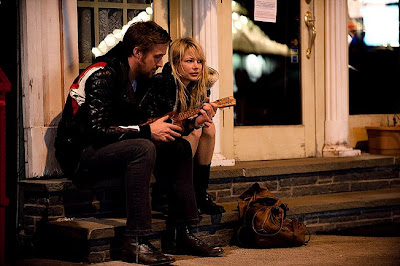 Blue Valentine has been plagued by the hoopla over the MPAA's initial NC-17 rating; after an intense appeal process, the film (released in theaters December 29th) will be rated R, without any edits from the unrated cut that has been circling the festival circuit followed by heaps of praise. Every single lick of praise is well deserved for this small gem - Blue Valentine is one of my favorite films of the year (narrowly losing out to Aronofsky's masterpiece in Black Swan for the top spot), tapping into a deep emotional reserve that I've never quite seen splayed across the screen. Prepare for the onslaught of tears.
Blue Valentine has been plagued by the hoopla over the MPAA's initial NC-17 rating; after an intense appeal process, the film (released in theaters December 29th) will be rated R, without any edits from the unrated cut that has been circling the festival circuit followed by heaps of praise. Every single lick of praise is well deserved for this small gem - Blue Valentine is one of my favorite films of the year (narrowly losing out to Aronofsky's masterpiece in Black Swan for the top spot), tapping into a deep emotional reserve that I've never quite seen splayed across the screen. Prepare for the onslaught of tears.Blue Valentine tells the tale of two lovers, Dean (Ryan Gosling) and Cindy (Michelle Williams). The story flits between the couple's dissolving marriage, centered around their daughter Frankie (the adorable Faith Wladyka, making a gorgeous feature debut that is absolutely heartbreaking), and the romantic kindling to their torrid relationship years earlier. One of the most astounding things about Blue Valentine is the emotionally punch behind such a seemingly slight structure; the narrative plays light and loose, but the way the film grabs you by the heart and never lets go is almost crippling. I have never seen a film this intense, or this real. I was wrecked by the time the credits rolled, so deeply affected I could barely move. It's a realism that's shattering and nearly revolutionary; watch who you see this film with, because the aftereffects are profound. This is the pinnacle of independent cinema, and a height that the industry should continually strive for.
The center of the film is focused on the couple's stay at a cheap "romance" motel, attempting to rekindle some sort of sexual chemistry that's been missing. The scenes in the motel are nearly embarrassing to watch, uncomfortable in the way that it feels like you're spying on a couple's most intimate, secret moments; it's a good thing that edits were not forced upon the studio to received an R rating, because deleting a single element would have diminished the spell this film casts. When things turn to the almost unbearable, director Derek Cianfrance flips to the giddy memories of true love, and the picture explodes in its tension between the two times.
Cinafrance crafts a rough, documentary aesthetic that works entirely with his seemingly invisible presence, and he pulls out impeccible performances from his two leads. The physical transformation between the two time periods is remarkable in and of itself, but the way both Gosling and Williams behave as coiled balls of energy is truly breathtaking. Both actors have fully inhabited their characters, and are completely devoted to their relationship at two distinctly different moments. Allegedly Gosling and Williams lived together before and during shooting, even participating in scripted conversations and fights. The performances carry an honesty that isn't usually seen in Hollywood; it's true naked abandon, and if both aren't awarded Oscar nominations, I will be livid. This is the best work the two have ever done.
The fact that the early NC-17 rating, and that the film is often said to be too "gory" in its depiction of a dying relationship, might hurt the chances of Oscar nominations for Blue Valentine makes me incredibly sad. If the (historically conservative) Academy can't recognize the bravest piece of cinema on screens this year, then something must change. Blue Valentine is gritty, raw, and honest with every frame. It's a pulsating depiction of love in all of its stages; it's not an easy film, but it's something that will touch everyone. The film is heartbreaking, but strangely uplifting. There is a unyielding heart beating firmly at the core of Blue Valentine; the film ends with an ellipses, not a period. It's not always perfect filmmaking, but the emotions at its core are undeniably perfect, almost impossibly rendered. Blue Valentine shows something truly beautiful, delicate and unflinching. A+



No comments:
Post a Comment